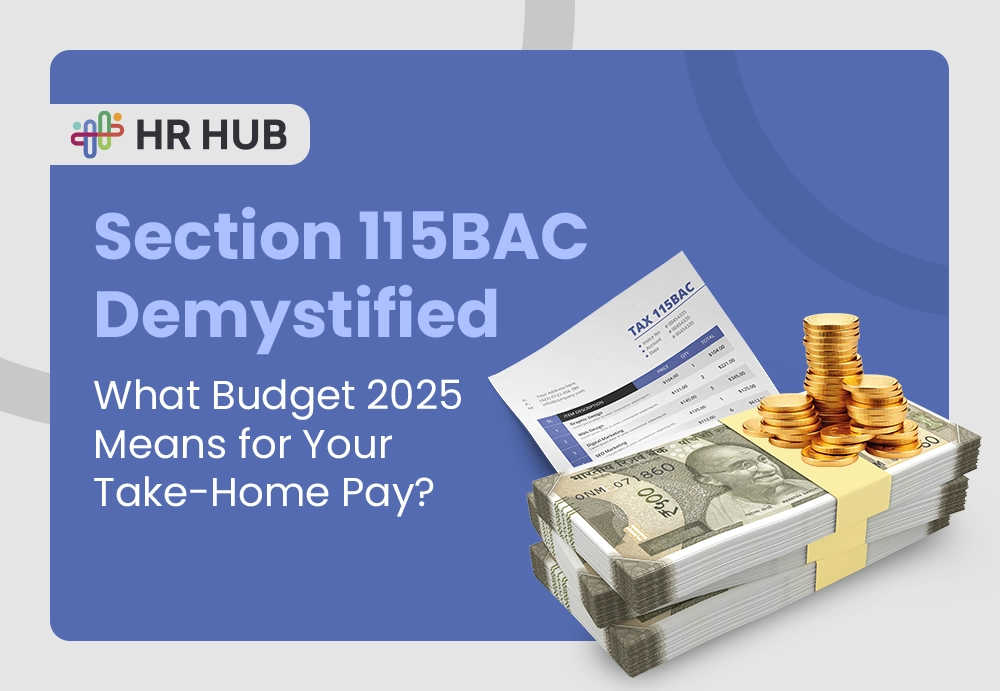Picture this: a small business owner juggling payroll deadlines with one hand, tracking attendance with another, and still trying to grow the business in the middle of it all. Sounds exhausting. For many small companies, this is the daily reality.
Now imagine having an extra set of hands—ones that never get tired, never forget a deadline, and always keep data neat and accessible. That’s exactly what HR software for small businesses feels like: not just a tool, but a partner that quietly takes care of the chaos while you focus on building your dream.
Why Small Businesses Struggle Without Digital HR
Running HR on spreadsheets and paper might sound cost-saving, but it often creates hidden losses. Missed compliance dates, salary miscalculations, or delays in leave approvals slowly chip away at employee trust. And here’s the kicker—employees today expect digital-first workplaces, even in small teams.
Without a proper HR system, businesses struggle to grow. They grow by managing businesses through firefighting, rather than struggling to grow, because they focus on firefighting rather than strategic planning. This could have been used to win clients or scale operations, but instead, it's lost to correcting Excel errors or chasing missing data. Growth slows down, frustration builds up, and businesses risk being stuck in survival mode.

How HR Software Unlocks Efficiency Across the Employee Lifecycle
Small businesses thrive on people power — every new hire, every retained employee, and every decision about workforce management impacts growth directly. But when HR tasks are handled manually, the employee lifecycle often feels disjointed: recruitment slows down, onboarding gets messy, payroll becomes error-prone, and employee growth is overlooked.
HR software for small businesses fixes this by supporting efficiency at every single stage of the employee journey. Let’s walk through it step by step.
1. Recruitment: Finding the Right Talent Faster
Hiring is one of the toughest challenges for small businesses. With limited brand recognition, attracting candidates takes extra effort. Adding manual resume sorting and interview scheduling makes the recruitment process painfully slow.
How HR software helps:
- Automates job postings across multiple platforms.
- Parses resumes and highlights top candidates.
- Keeps candidate communication organized through an applicant tracking system (ATS).
2. Onboarding: Creating a Smooth First Impression
A chaotic onboarding process — marked by missing documents, unclear training, and delayed equipment — leaves new hires questioning the company from day one. For small businesses, every new employee counts, so the first impression must be strong.
How HR software helps:
- Digital onboarding forms and e-signatures reduce paperwork.
- Task checklists ensure IT setup, training, and introductions happen on time.
- Company policies, benefits, and welcome kits are shared through the portal.
3. Attendance & Scheduling: Keeping Work Transparent
Small businesses often deal with flexible hours, shift work, or hybrid models. Manual attendance sheets don’t capture half-day leaves, remote check-ins, or weekend shifts accurately.
How HR software helps:
- Biometric, mobile app, or geofencing options ensure accurate records.
- Leave balances update in real time when requests are approved.
- Shift scheduling tools prevent understaffing during peak hours.
4. Payroll & Compliance: Reducing Stress Every Month
Payroll is where errors hurt the most. For small companies, late or incorrect salaries can quickly damage trust. Manual payroll also risks compliance slips that lead to penalties.
How HR software helps:
- Automates salary calculations, including overtime, bonuses, and reimbursements.
- Keeps up-to-date with tax laws and statutory deductions.
- Generates payslips, TDS reports, and compliance filings in minutes.
5. Employee Self-Service: Empowering Teams
Small HR teams often struggle with repetitive queries, such as “Can you send me my payslip?” or “How many leaves do I have left?” This slows everyone down.
How HR software helps:
- Employees access payslips, tax forms, and leave balances directly.
- They can update personal details without emailing HR.
- HR workload shrinks, while employees feel more independent.
6. Performance & Growth: Making Reviews Fair and Useful
In small businesses, performance discussions often happen informally. Without structure, biases creep in, and top performers don’t get recognized properly.
How HR software helps:
- Aligns goals with company objectives.
- Enables regular check-ins and 360-degree feedback.
- Tracks performance trends to identify future leaders.
7. Training & Development: Building Skills for Tomorrow
Employees in small companies often wear multiple hats. Without proper training, they feel overwhelmed and disengaged.
How HR software helps:
- Tracks certifications and renewal dates.
- Hosts e-learning modules or integrates with learning platforms.
- Provides analytics on skill gaps and training progress.
8. Expense & Reimbursement Management: Cutting the Paper Trail
Small companies can’t afford long delays in expense settlements — it frustrates employees and disrupts cash flow.
How HR software helps:
- Employees upload receipts through mobile apps.
- Managers approve digitally, and reimbursements sync with payroll.
- Speeds up payments and improves financial transparency.
9. Offboarding: Closing the Loop Smoothly
Even when employees exit, small businesses must manage compliance, asset returns, and knowledge transfer properly. Manual offboarding risks missing critical steps.
How HR software helps:
- Automates clearance checklists (IT assets, documents, benefits).
- Ensures compliance with notice periods and final settlement rules.
- Captures exit feedback for retention insights.
From Efficiency to Growth: The Bigger Picture
Saving time and avoiding errors is great — but let’s be honest, small business owners don’t dream of just “running smoothly.” They dream of growth, expansion, and becoming the kind of workplace that employees don’t want to leave. And this is where HR software shines brightest. It doesn’t just clean up processes — it actually pushes the business forward.
1. Employee Retention Becomes Easier
Small businesses often underestimate retention. Losing even one employee means posting ads, interviewing, training replacements, and dealing with a temporary productivity dip. The costs can easily run into thousands — money small companies can’t afford to waste.
How HR software makes a difference:
- On-time, accurate payroll builds trust. Nobody wants to chase their paycheck.
- Transparent leave balances and fair attendance tracking reduce employee frustration.
- Structured career development through goal-setting and performance reviews shows employees that there’s room to grow.
2. Data Drives Smarter Decisions
When HR runs on paper or spreadsheets, you only see the tip of the iceberg. You know salaries are paid and leaves are approved, but the patterns — rising absenteeism, declining productivity, high turnover in one role — stay hidden.
With HR software:
- Dashboards show real-time workforce metrics.
- Reports highlight trends, such as frequent absenteeism in a department or rising overtime costs.
- Managers act early, preventing small issues from turning into crises.
3. Scaling Without Chaos
Growth is every small business owner’s dream. But adding headcount usually means multiplying HR headaches: more payroll entries, more leave requests, more compliance filings. Without the right system, growth feels like chaos.
HR software flips the script:
- Whether you have 10 or 100 employees, the same system handles payroll, attendance, and records seamlessly.
- Processes stay consistent, which is crucial for maintaining culture and compliance.
- Owners and managers focus on strategy, not drowning in admin work.
4. Building a Strong Employer Brand
In today’s competitive talent market, perception matters. A clunky hiring process, delayed onboarding, or outdated HR practices make small businesses look… well, small.
With HR software:
- Candidates experience smooth applications and timely updates.
- New hires feel welcomed with structured onboarding.
- Existing employees enjoy modern self-service tools that signal professionalism.

How to Choose the Right HR System for Small Business
Now comes the tricky part: picking the right system. Small businesses often get dazzled by flashy features, but what they really need is a tool that fits their size, budget, and growth plans.
Here’s what to prioritize:
- Ease of Use: If employees find it complicated, adoption fails. Go for clean, intuitive interfaces.
- Affordability: Subscription-based, cloud-hosted tools are budget-friendly and require no heavy IT investment.
- Integration: The software should connect with the accounting, payroll, and communication tools you already use.
- Scalability: Choose a system that grows with you. Switching later is costly and disruptive.
- Support: With no in-house IT team, small businesses need responsive vendor support to solve issues quickly.
Pro tip: Don’t chase the “biggest” software. Chase the one that’s right-sized for your team today, but ready for tomorrow.
Moving from Chaos to Clarity
Running a small business will always come with challenges. But managing people doesn’t have to be one of them. The right HR software for small businesses transforms HR from a daily headache into a source of clarity, structure, and growth.
That’s where HR HUB steps in. More than just software, HR HUB is built to empower small businesses with tools for payroll, attendance, recruitment, performance, and compliance—all in one integrated platform. Whether you’re a growing startup or a 100-person firm ready to expand further, HR HUB gives you the confidence to scale without losing control.
Because in the journey of growth, clarity isn’t optional—it’s everything. And HR HUB helps you achieve exactly that.






